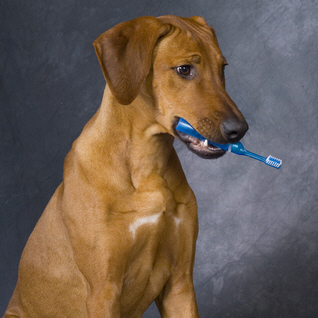When I first adopted Frankie, I resigned myself to the many things I had to do to keep him healthy and, yes, presentable. Regular checkups, including vaccinations. Keeping his coat from getting matted. Nail trimming to prevent discomfort that can mimic arthritis — and to head off that annoying click click clicking on my hardwood floors.
But I drew the line at brushing Frankie’s teeth, or having them cleaned professionally.
He’s a dog, for heavens sake, I rationalized. Would you brush a wolf’s teeth? Dental care is anthropomorphism gone wild.

Truth is, I avoided dealing with Frankie’s teeth during my first few years with him because I didn’t want to. His teeth are short but sharp, and I suspected he’d be opposed to having me put anything besides food or toys into his mouth. And professional cleanings are pricey.
But then Frankie got diabetes. And at one point in my quest for a blood sugar-lowering diet, three different vets looked into Frankie’s mouth, clucked, and recommended teeth cleaning, suggesting that, if unchecked, the bacteria massing in Frankie’s gums might course through his immunity-impaired bloodstream and attack his heart, brain, lungs, and liver.
So I did what I tend to do when I’m scared silly about something: Researched it.
It turns out that:
- Dental disease is extremely common in dogs. According to the American Veterinary Dental Council, periodontal disease is the most common clinical condition in companion animals. At least 75% of dogs show signs of it by the time they’re two or three years old. And because these statistics rely on a sample of pets that receive regular veterinary care, the percentage is likely higher. Warning: The AVDC provides a link to the Veterinary Oral Health Council’s site which opens up to an incredibly gross picture of advanced periodontal disease. It might scare you into taking care of your dog’s teeth — or just scare you away from the site.
- Small dogs are particularly at risk. Periodontal disease is rampant among small and toy breeds, which have disproportionately large teeth for their small mouths and jaws. Because of this crowding, food and debris — precursors to plaque and tartar — get caught on and between teeth. This, in turn, leads to the teeth becoming loose and, often, infection setting in. In extreme cases, small dogs have such severe dental disease that they can break their jaws.
- More and more links between dental care and general health are being found. The awareness of the impact of dental disease on other body systems, in humans as well as in dogs, is relatively new, but studies on humans show that advanced periodontal diseases lowers mortality.
Besides, has anyone done a study on tooth decay in prehistoric wolves? Who knows? They may have passed a predisposition to periodontal disease down to their canine kin. (Just kidding, all you BARF advocates who will advise me to switch Frankie’s diet instead of cleaning his teeth.)
The upshot of my research was that I finally took Frankie in for a professional cleaning. Stay tuned for details…

When I adopted Buddha he had terrible teeth. A few were broken and had to be removed, then very quickly 2 abscesses acted up, one after the other and he suffered terribly. We were already brushing the other 2 dogs regularly (and were desensitizing poor Buddha too it) but after those experiences it seemed even more urgent.
As for BARF, I hear it also guarantees wealth, good luck, and freedom from the heartbreak of psoriasis, but that could just be hyperbole.
Good on you for adopting a dog with costly dental problems. There’s surely a reincarnation bonus reserved for that.
And yes, you’re correct about BARF. It also reverses global warming.
Nail trimming prevents arthritis?? Okay, now I’ve entered the guilt-encumbered zone. Haven’t kept up with that so much this last year. Archie has arthritis. But in my defense, he is about 16 years old…. Off to the vet tomorrow morning, whether he likes it or not!
Actually, I just checked, and discovered that nail trimming causes discomfort in walking that can be mistaken for arthritis (which of course Archie has). Can’t hurt to trim his nails, though; it might help him walk. No guilt!
Whew! Thanks.
For a long time, I didn’t recognize the importance of getting my pets’ teeth cleaned. But then I realized… aside from the systemic problems dental infections can cause, they can be downright painful.
Now I look at pet dentals the same way I think about high-quality food — expensive in the short-run but pays for itself in the long-run.
Kudos for taking Frankie in for a dental!
Thanks for a useful post. Love this website 🙂 Btw, your site looks a little wierd in opera browser. Works fine in firefox. Dentist Kent WA
Thanks for your comment. Since the blog redesign is still a work in progress, I appreciate your input. So.. looks weird in opera how, i.e., what do you see?